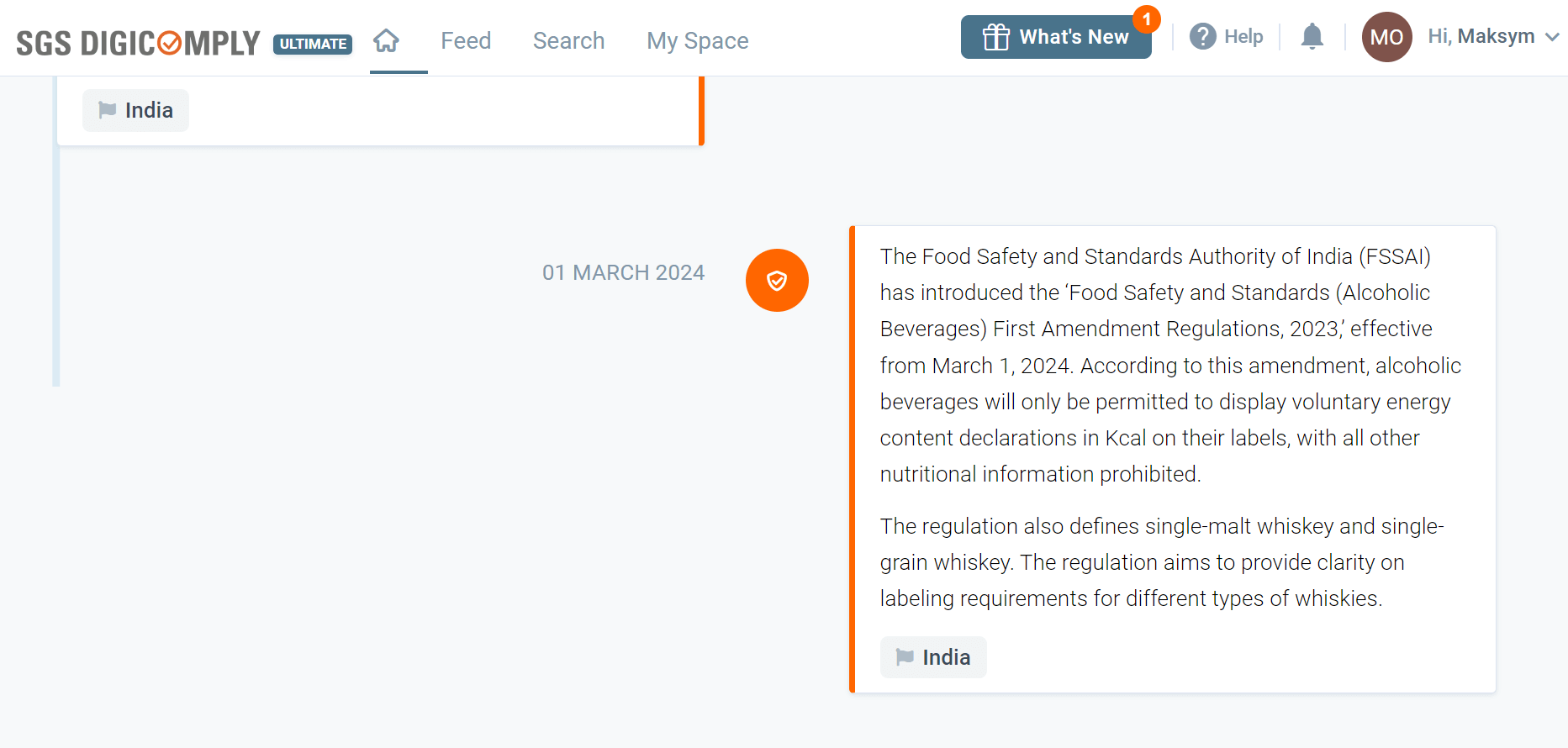On March 1, 2024, India's food and beverage industry witnessed a significant regulatory change with the implementation of the 'Food Safety and Standards (Alcoholic Beverages) First Amendment Regulations, 2023' by the Food Safety and Standards Authority of India (FSSAI). This amendment, identified through monitoring by the SGS Digicomply Regulatory Agenda, brings about substantial alterations to the labeling standards for alcoholic beverages nationwide. This article offers a detailed examination of the introduced changes and their potential implications for manufacturers, consumers, and the overall market.

Feel free to get in touch now to learn about implementing the Regulatory Agenda Hub for your company. Or explore the demo and try this tool in action.
The 2023 Amendment Overview:
The FSSAI's latest amendment introduces a noteworthy change in the labeling regulations for alcoholic beverages. Specifically, it mandates that such beverages may only display voluntary declarations of energy content in kilocalories (kcal) on their labels, effectively banning the inclusion of all other nutritional information. This regulation aims to streamline the information presented to consumers, focusing on energy content as the primary piece of nutritional data. The enforcement of this rule starting March 2024 underscores the FSSAI's commitment to adapting regulatory frameworks in response to evolving industry practices and consumer information needs.
Impact on Alcoholic Beverage Labeling:
The new amendment's restriction to energy content declarations represents a significant pivot from previous labeling practices. This move is expected to simplify labels, making them less cluttered with information that might not be as relevant to consumers of alcoholic beverages. However, it also raises questions about the balance between simplification and the provision of comprehensive nutritional information. By limiting labels to only include energy content, consumers seeking details on carbohydrates, proteins, or fats will find such data absent. This decision by the FSSAI reflects a tailored approach to alcoholic beverage labeling, acknowledging that the primary concern for consumers might lean more towards caloric intake rather than a full nutritional breakdown.
Clarification on Whiskey Types:
An integral part of the amendment is the clear definitions it sets for single-malt whiskey and single-grain whiskey. This clarification is a boon for both producers and consumers, as it eliminates ambiguity around these terms. According to the regulation, single malt whiskey is defined as a product derived exclusively from malted barley, distilled in a single location, offering a distinct identity to the beverage. Similarly, single-grain whiskey is specified as being produced from either malted or unmalted grains, distilled at a single facility. These definitions ensure that labels accurately reflect the production process and ingredients, fostering transparency and trust in the whiskey market.
Industry and Consumer Reaction:
The reaction to the FSSAI's amendment is anticipated to be mixed. From an industry perspective, manufacturers might welcome the simplification of labeling requirements as it could reduce the complexity and cost associated with providing detailed nutritional information. Conversely, consumers accustomed to accessing a wide range of nutritional data might view this change with skepticism, concerned about the reduced transparency. Nevertheless, the focus on energy content aligns with global trends in alcohol labeling, where caloric information is often emphasized over detailed nutritional breakdowns.
Conclusion:
The "Food Safety and Standards (Alcoholic Beverages) First Amendment Regulations, 2023" represents a pivotal moment in the regulation of alcoholic beverage labeling in India. By mandating the inclusion of energy content while excluding other nutritional details, the FSSAI is steering the industry towards a simplified, consumer-friendly approach. This amendment, effective from March 2024, underscores the authority's ongoing efforts to refine food safety standards in alignment with both domestic and international best practices. As stakeholders adapt to these changes, the role of platforms like SGS Digicomply in disseminating regulatory updates becomes increasingly invaluable, ensuring that the industry remains well-informed and compliant.





.webp?width=1644&height=1254&name=Food%20Safety%20Dashboard%201%20(1).webp)
